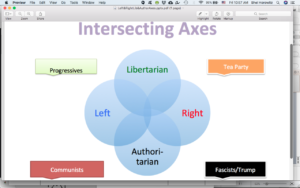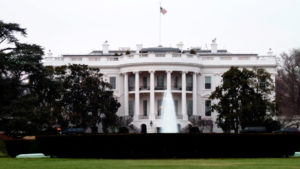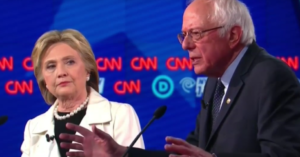It’s Not Just About Left vs. Right—Think About This Other Very Important Thing
Read this brief article. Then come back and let’s talk about it. This tab will still be open in your browser.
I found it a fascinating yet quick deep-dive into the liberal versus conservative mindset. Sharing this article on Facebook (where I happened to see it), Nathan Mackenzie Brown, founder of Really American commented,
A must read if you care about politics. FYI, it’s also very short.
My take away from this is, if you are liberal, don’t fear monger, even about Trump.
The authors’ central point is that when we feel personally secure, we tilt more liberal, and when we feel, threatened we lurch rightward. Not exactly rocket science, I know. But what they bring to the table is the idea that if we address the security concerns, the political tilt is actually reversible.
This is something that DT innately understands—the power of fear. He built his base by demonizing various Others. My capitalized O is intentional; I’m talking about whole groups and classes of people (Mexicans, Muslims, the press, etc..
It’s very rare to run a successful US national campaign rooted in fear. Reagan (“morning in America”) and Obama (“hope” and “change”) both won on optimism. Laughable as it seemed at the time and even more so in retrospect, Bush II ran as a “compassionate conservative.” Even Nixon ran on his “secret plan to end the war.”
But DT mixed a very pessimistic worldview, based largely in “they’re out to get us” with a soaringly optimistic slogan (MAGA). His opponent was a centrist with close ties to the groups DT was calling out.
Hillary Clinton also failed to consistently express strong political views, and tried to harness competing slogans at cross purposes: the wimpy and ineffectual “I’m with her” and the arrogant “it’s her turn”/”it’s our turn” both reinforcing the perception that she was an in-group, establishment figure out of touch with the public, while “stronger together” was somewhat optimistic but not really rooted in vision, and seemed a reaction to DT’s divisiveness.
George Lakoff and others have written that conservative politics are often rooted in an authoritarian-father mindset, while liberals are the products of permissive-parenting thinking. I have a number of issues with Lakoff’s approach, though I see much truth in it.

But let me add one of my own long-held theories: Beyond the Left-Right axis, we have to look at another set of operating principles: where someone stands on freedom vs. control. So at the top end of this graphic (which is copyright 2018 by Shel Horowitz, as is the entire post—please contact me if you’d like to reprint), progressive environmentalists and Tea Partiers concerned about wasteful government spending join together in the Green Scissors coalition.
At the bottom end, I don’t see a lot of difference between communists and fascists other than their idea of who should control the means of production. They are both totally willing to rough up or even (historically) mass-murder their opponents, seize or maintain power by force of arms, and crush dissent. Was Hitler really so different from Stalin?
Let’s get some good discussion going on this. Comment below.






